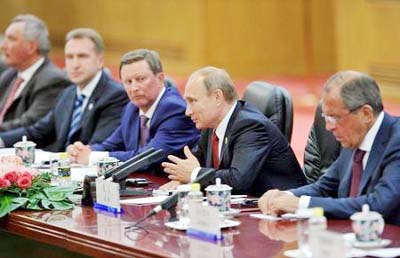
Reuters, Vladivostok :
Chinese Vice Premier Wang Yang said on Saturday that Russia’s push to revamp its run-down Far East region coincided with Beijing’s strategy, backing President Vladimir Putin’s drive for new sources of growth.
At the Eastern Economic Forum in the Pacific Port of Vladivostok on Friday, Putin promised favorable business conditions and state support to Asian and domestic investors willing to come to Russia’s most remote land.
“The Far East development strategy coincides with China’s strategy of north-east rebirth,” Wang said. “(The) Russia-Chinese partnership will definitely bring generous fruits.”
But for Putin’s campaign to attract Asian funds to Russia, timing may be his worst enemy: the slowdown in the Chinese economy poses risks.
Putin’s turn to Asia comes at a time when relations with the West have hit their lowest since the Cold War, following Moscow’s involvement in the Ukraine conflict.
Russia needs money badly – sanctions and falling oil prices have hit the economy hard, with gross domestic product expected to fall 3.3 percent this year after growing 0.6 percent in 2014. China’s growth, meanwhile, is slowing and its stock market falling, forcing Beijing into rate cuts and a yuan devaluation to buttress the economy.
Ian Ivory, a partner at Golstblat BLP, said the Chinese slowdown will hardest affect emerging markets which are providers of raw materials.
“Russia is another classic example that will feel the pain, and China will be a further negative drag on the Russian economy,” Ivory said in e-mailed comments.
Andrey Kuzyayev, a former head of overseas operations at Lukoil, Russia’s No.2 oil producer, played down the worries, saying the development of the Far East was not a temporary whim, but a long-term goal for the country.
Chinese Vice Premier Wang Yang said on Saturday that Russia’s push to revamp its run-down Far East region coincided with Beijing’s strategy, backing President Vladimir Putin’s drive for new sources of growth.
At the Eastern Economic Forum in the Pacific Port of Vladivostok on Friday, Putin promised favorable business conditions and state support to Asian and domestic investors willing to come to Russia’s most remote land.
“The Far East development strategy coincides with China’s strategy of north-east rebirth,” Wang said. “(The) Russia-Chinese partnership will definitely bring generous fruits.”
But for Putin’s campaign to attract Asian funds to Russia, timing may be his worst enemy: the slowdown in the Chinese economy poses risks.
Putin’s turn to Asia comes at a time when relations with the West have hit their lowest since the Cold War, following Moscow’s involvement in the Ukraine conflict.
Russia needs money badly – sanctions and falling oil prices have hit the economy hard, with gross domestic product expected to fall 3.3 percent this year after growing 0.6 percent in 2014. China’s growth, meanwhile, is slowing and its stock market falling, forcing Beijing into rate cuts and a yuan devaluation to buttress the economy.
Ian Ivory, a partner at Golstblat BLP, said the Chinese slowdown will hardest affect emerging markets which are providers of raw materials.
“Russia is another classic example that will feel the pain, and China will be a further negative drag on the Russian economy,” Ivory said in e-mailed comments.
Andrey Kuzyayev, a former head of overseas operations at Lukoil, Russia’s No.2 oil producer, played down the worries, saying the development of the Far East was not a temporary whim, but a long-term goal for the country.

